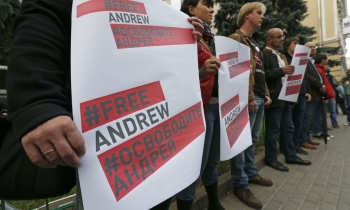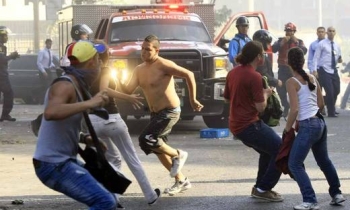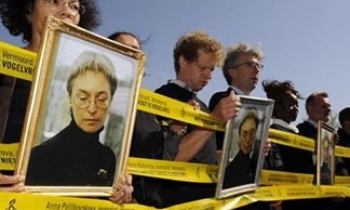NUEVO LAREDO, Mexico - If there was one characteristic that defined Heriberto Deandar Amador, founder of El Manana newspaper, it was fearlessness. A teenage telegraph operator during the Mexican revolution, Deandar dodged bullets as he wired telegrams.
He later founded the daily newspaper, taking on government leaders and powerful Mexican families. When the government retaliated by raising the price of newsprint, he smuggled rolls of paper from Texas.
Today, the offspring of Deandar, who died in 1968, confront hurdles more formidable than anything their ancestor faced. The family, which still publishes El Manana, is under siege by drug traffickers determined to prevent them from exposing cartel activities.
Pressure from traffickers has forced them to stop publishing investigative drug stories and to bury stories about drug-related violence inside the paper. The decision by the Deandars is part of a growing phenomenon in Mexico, where more and more journalists are practicing self-censorship, declining to write stories about narco activities for fear of retaliation.
"My father was not a communist, or a capitalist, but a humanist," said Ninfa Deandar Martinez, 65, editor and publisher of El Manana. "He loved humanity and cared very much about his employees and family, so much that if he knew they faced deadly risks he, too, would have taken the same action and imposed self-censorship."
Last month, gunmen fired on the paper's offices and lobbed two grenades into the newsroom. Authorities suspect drug traffickers were responsible.
The decision by El Manana and others means media coverage may not adequately reflect the enormity of Mexico's bloody drug war, which has been raging in Nuevo Laredo and has spread to other cities such as Acapulco and Monterrey. The media chill has even seeped across the Rio Grande, as some American journalists debate whether covering the story is worth risking their lives.
Last week, gunmen opened fire on four state police officers, killing two of them. Many reporters in Nuevo Laredo ignored the incident. Media in Laredo covered the story, although TV stations did not show any video.
"There was an indefinite embargo," one Mexican reporter said with grim humor. In the industry, an "embargo" is a hold on publishing a story.
Added Juan Rodriguez, a veteran reporter for Univision TV in Laredo: "We live under a psychosis that leaves you cold. You think twice before reporting drug stories in Nuevo Laredo, or here."
Reporter Javier Trujillo of the tiny Acapulco weekly La Palabra said a chill in drug reporting there began less than a year ago with the expansion of the Sinaloa cartel into the beach resort. Eight months ago, armed men showed up at La Palabra and bought 800 newspapers that had not yet been distributed, Trujillo said. The edition contained stories about the Sinaloa cartel.
"It's a very difficult situation," he said. "You play ball with them, or you play ball with them."
Along the border, journalists often receive instructions from cartel representatives - who sometimes are colleagues, some journalists say.
Editors in Nuevo Laredo proofread their work repeatedly before turning it in, to make sure they haven't crossed any lines. A wrong move could result in the kidnapping and severe beating of the offending reporter, journalists said.
In early January, reporters in Laredo said, the brother of a purported leader of the Gulf cartel in Nuevo Laredo was killed. An ultimatum came down from the cartel, the reporters said: no press coverage on either side of the border. Diana Fuentes, editor of The Laredo Morning Times, said any lack of coverage at her newspaper has less to do with newsroom self-censorship than with caution from the newspaper's Nuevo Laredo reporter, a freelancer on whom the paper relies for cross-border information.
KGNS-TV news director Ray Gomez said: "We don't necessarily hold back. The problem is getting the information. We rely on stringers (freelancers) and sometimes they self-censor themselves. You can't blame El Manana for its decision because there is a real sense that the government has lost control and so the media has no protection. I will not force any of my people to cover a story there. It's their decision."
Free-press advocates decry the straitjacket into which Mexican journalists are being forced.
"Freedom of the press is the cornerstone of democratic government, and we have a special obligation to protect journalists - particularly those who put their lives on the line to expose illegal activity," said U.S. Ambassador Tony Garza. "Failing to fight those who kill and maim journalists, or looking the other way when such an outrage occurs, puts democracy at risk."
Ninfa Deandar Martinez's father founded El Manana in 1924 as a way to protect the ideals of the revolution and to give a voice to the voiceless, said Deandar, who later became the nation's first female newspaper editor. She now runs the newspaper with her two sons, Ramon and Heriberto, and daughter Ninfa.
As workers fixed holes where bullets rang out on Feb. 6 and left reporter Jaime Orozco paralyzed, she contemplated what she called a weakened rule of law and the nation's "social decomposition."
"A paper that's heavily censored is a newspaper without spirit and soul," Deandar said, her eyes turning watery. "And Nuevo Laredo these days has lost its spirit and soul."









